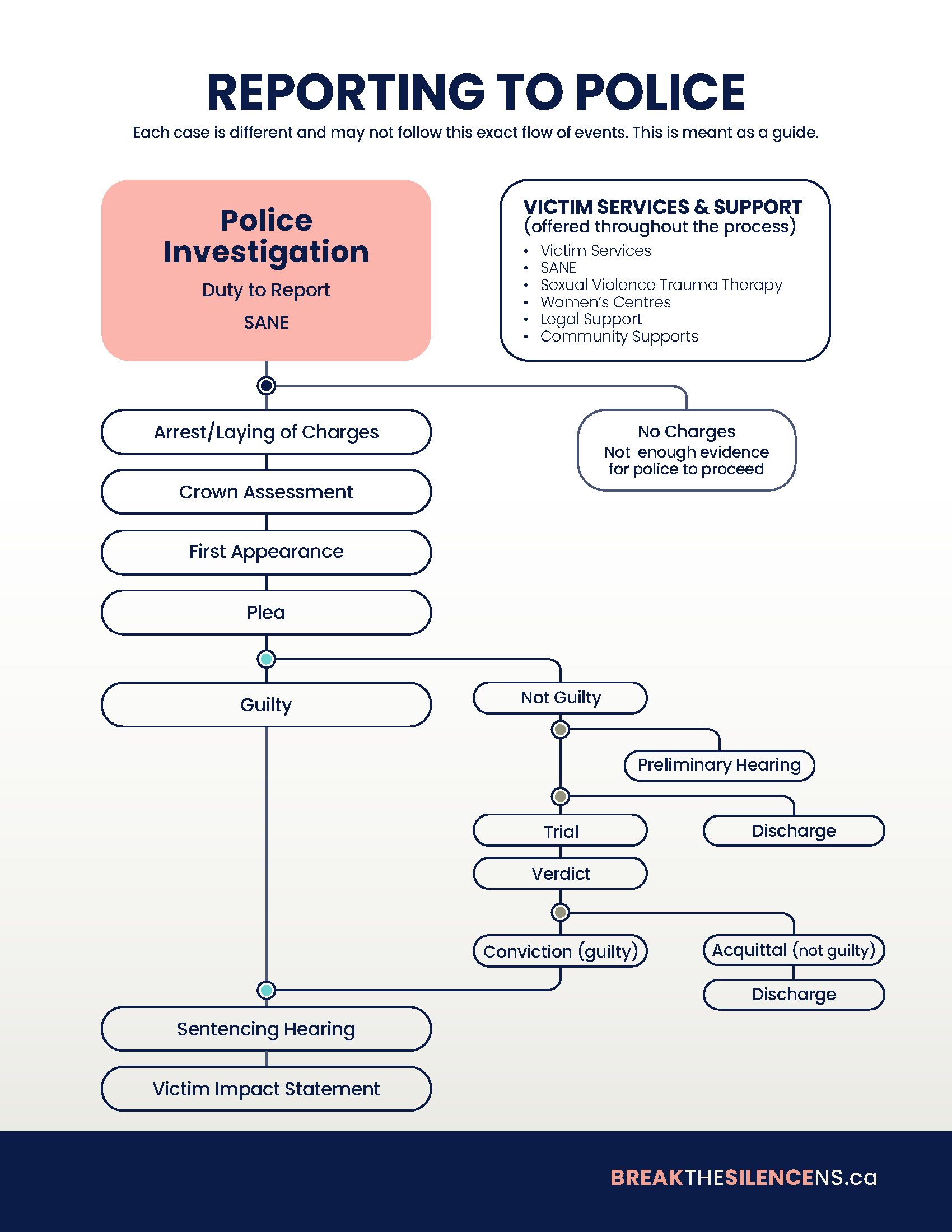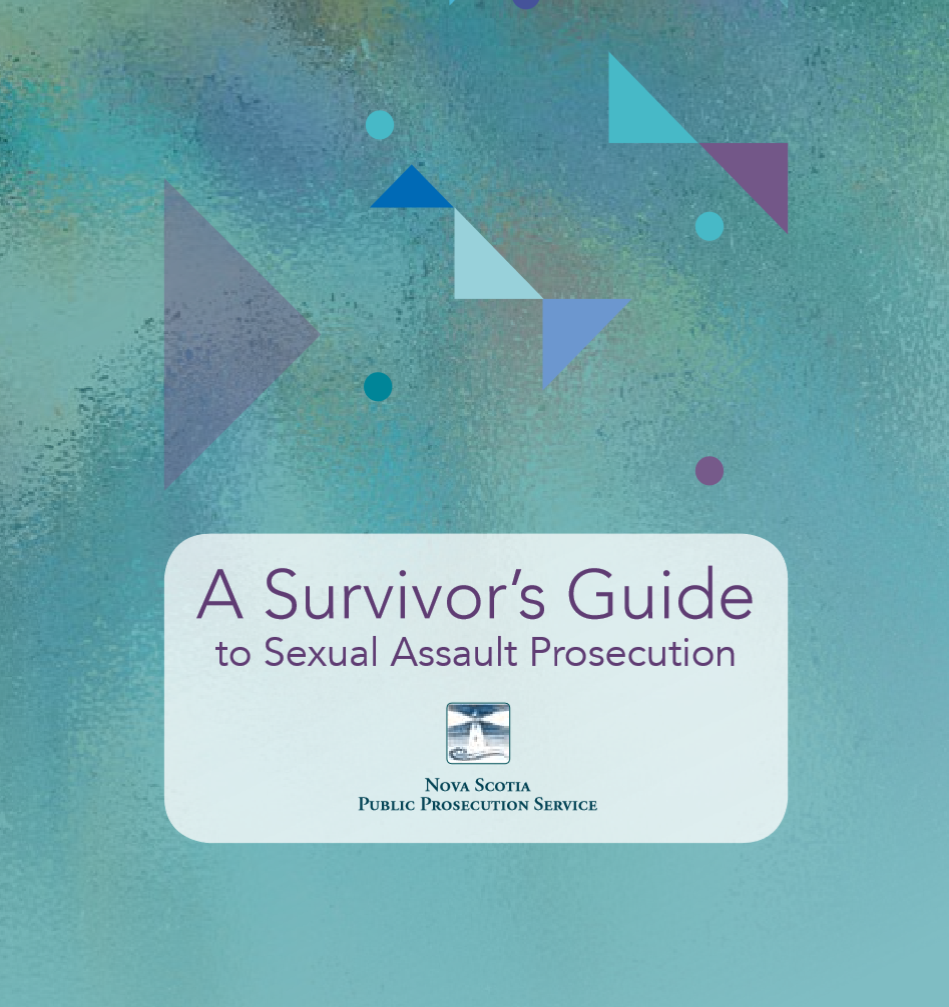Reporting to the Police
If the Victim/Survivor Chooses to Report
When a victim/survivor chooses to report to police there will be a series of steps. How the process unfolds will depend on the perceived seriousness of the crime and whether the accused pleads guilty or not guilty. The length of the entire process varies and can take several months, or even years. There are often lengthy periods between each court hearing.
Can the accused claim that they mistakenly thought they had consent?
In court, the accused may claim that they thought they had consent, and the judge may accept this argument.
According to Canadian law, a person cannot claim that they thought the victim/survivor consented when:
- If being intoxicated led them to believe that the victim/survivor had consented;
- They were “reckless” about determining if the victim/survivor was consenting.
- They ignored cues that there was no consent.
- They didn’t “take proper steps” to see if there was consent.
The accused also cannot claim that the act was consensual because they waited a sufficient amount of time after a “no” and the victim/survivor did not express a “no” again. If someone communicates no, it is a no until the person agrees to the same sexual act.
Reporting To Police Flowchart

Click on any of these steps in the flow chart to read more.
Why might people be hesitant to report to police?
- Victim/survivors are often not believed and are blamed for what happened to them.
- It is rare for a sexual assault charge to result in a conviction and a victim/survivor may feel that it is pointless and will only cause further emotional distress.
- It can be re-traumatizing to tell your story to authority figures such as police officers and lawyers.
- The victim/survivor often knows the person who perpetrated the sexual violence.
- Some people do not see what has happened to them as sexual violence.
- Many blame themselves for the violence.
- Gaps in memory caused by stress or trauma can make reporting sexual violence challenging, even if it occurred recently.
- It can be difficult to establish physical evidence of sexual violence.
Independent Legal Advice Program
This program provides up to 4 hours of free, independent legal advice for victims/survivors who are 16+ years of age who were sexually assaulted in Nova Scotia. Registration is done through an independent agency, 211 Nova Scotia, and participants do not have to report to police or take legal action if they use this service.
To register, a victim/survivor can call 2-1-1. They do not need to provide details about what happened. They only have to say that they were sexually assaulted in Nova Scotia, and that they would like to speak with a lawyer.
Once registered, a package will be mailed with a certificate number for 2-hours of legal advice. The package will also have a list of participating lawyers.
The victim/survivor can choose any lawyer on the list. To help make the choice, there is a biography about each lawyers’ background and experience. All of the lawyers have been screened by the program, have received training, and have agreed to follow the program’s terms.
Once a lawyer is selected, the victim/survivor can contact them and give them the number on the 2-hour certificate. Meetings with the lawyer can be done in person, by telephone, or through videoconferencing like Skype. If more time is needed, the victim/survivor can contact 211 NS for another 2-hour certificate.
The program was created by Nova Scotia’s Department of Justice, but the Department does not have access to participants’ names or contact information. The only information that 211 NS will share with the Department of Justice is non-identifying data. This information helps to measure if the program is being used.
To learn more, visit: https://novascotia.ca/sexualassaultlegaladvice/ or call 2-1-1 or download the pamphlet here.
Free Legal Representation Program - Section 276
Canada's rape shield law (Section 276 and 278 of the Criminal Code) prohibits a victim/survivor's past sexual history and personal records such as texts, journal entries or therapy notes, to be introduced in court. Neither can the "Twin Myths" be used as a defence. An application would have to be made by the defendant to have these laws overturned. If an application is made by the defendant, the victim/survivor will be entitled free legal representation on this specific matter.
"The “Twin Myths” refer to the falsely held belief that evidence of prior sexual activity can make the complainant either less credible or more likely to have consented to the sexual activity in question."
